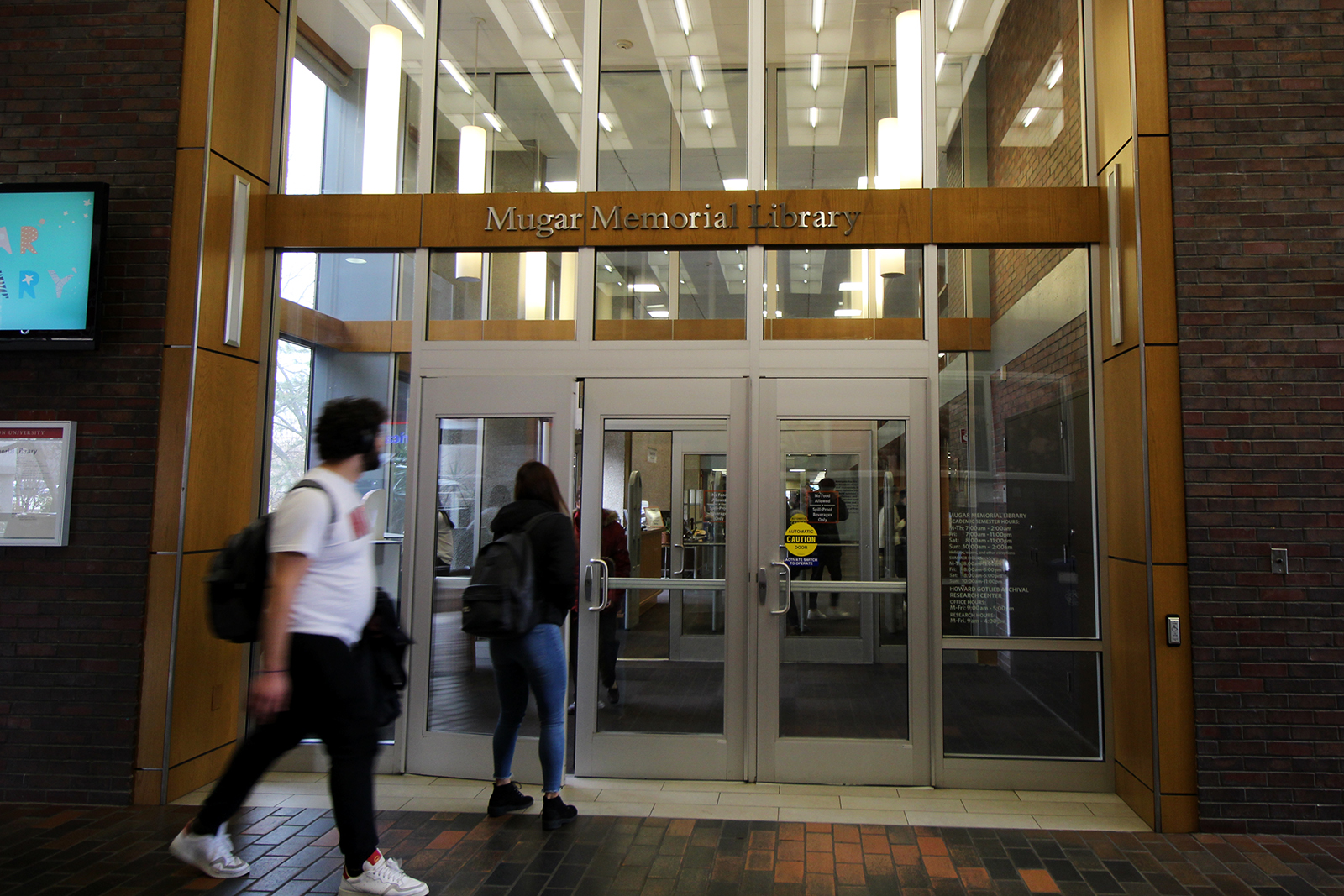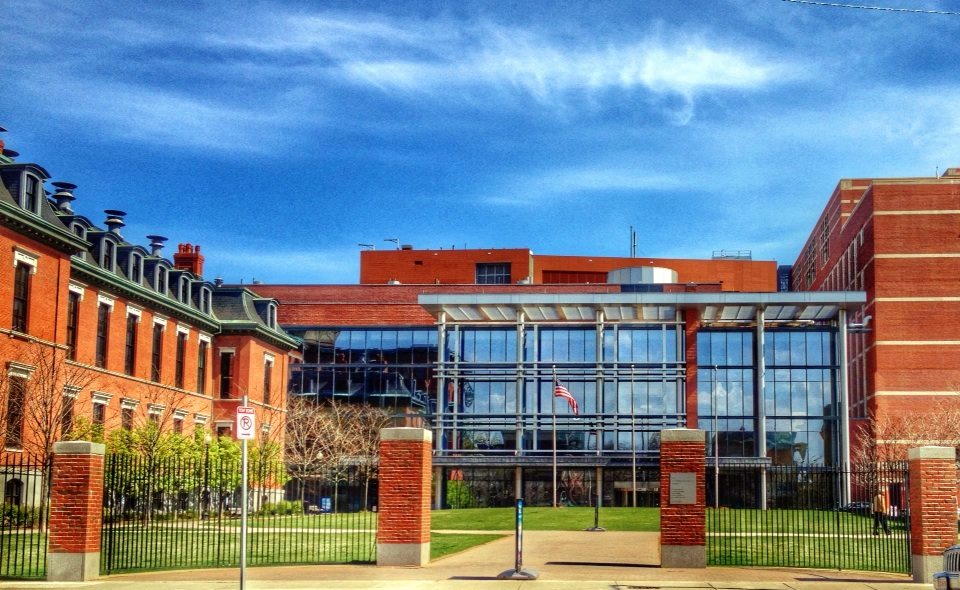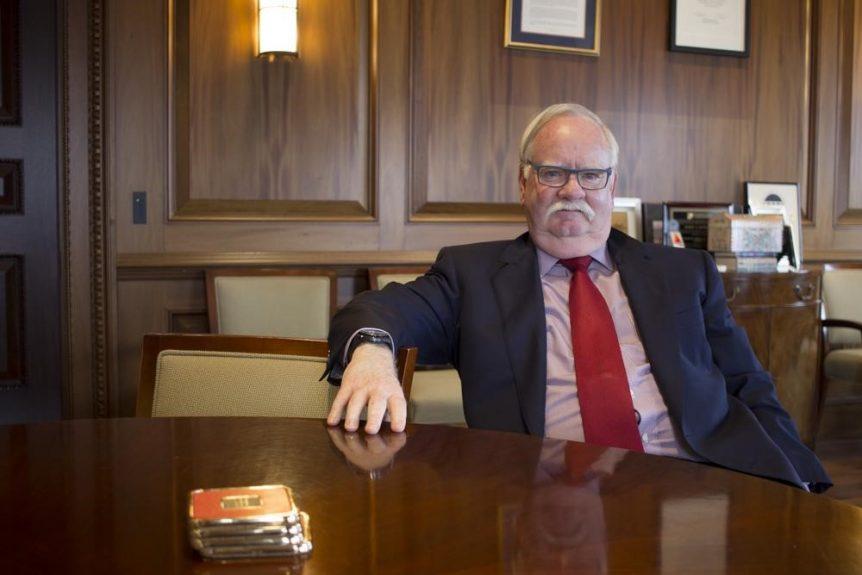By Colbi Edmonds and Cameron Morsberger
Multiple Boston University library staff members have been denied full workplace accommodations for the Spring semester despite health conditions and previous concessions for the Fall.
The Unionized Massachusetts Higher Education Faculty tweeted a screenshot of an email one library employee received, announcing the news. Staff who have received partial approval are required to work in person for a certain number of hours per week, according to the email.
Zachary Bos, vice president of the United Auto Workers Local 2324 Union and administrative coordinator for the College of Arts and Sciences Core Curriculum, said several BU Library employees had their requests to work fully remote next semester denied this past week.

“They’re dealing with spreadsheets, they’re dealing with vendors, it’s all computer work,” Bos said. “There’s no reason that they should be exposed to this needless risk.”
One Mugar Memorial Library staff member — who is not a representative of BU Libraries and requested to remain anonymous — has a pre-existing condition and lives with a high-risk individual. Despite working remotely since March, their full work adjustment request for the Spring was recently denied.
The staff member was granted a partial accommodation, meaning they will work in person twice a week starting next month. They said they’ve experienced “nervous breakdowns” because of their elevated risk for contracting COVID-19.
“It’s like a bedframe shattered in several places that someone put back together with duct tape and painted over with a chrome finish,” they said. “Then you get this bed frame, and the chrome finish just starts melting off. That’s what it feels like being in the libraries right now.”
Before their accommodation and others’ were denied, the staff member said library leadership and other University administrators put library staff “through hell and high water,” making it difficult for them to work remotely and miscommunicating how work would be conducted.
Having worked from home for the last several months, the staff member said their job is the same as it was before the pandemic and they have no reason to be in the physical library.
“There has not been any change,” they said, “and I have gained responsibilities, but none of those are responsibilities that need me to be in person.”
Many faculty members, Bos said, were opposed to continuing an in-person learning experience with Learn from Anywhere because it did not provide an ideal learning environment. He added that requiring staff to return to campus is unnecessary because some do not work in student-facing positions.
“I don’t think that the decision to repopulate the campus is being treated equitably across all the different divisions of employment at Boston University,” Bos said. “The people who don’t have the power, but who bear the brunt of decisions, aren’t pleased.”
The University’s decision to create a hybrid learning model and open campus back up, Bos said, was likely driven by finances and a desire to deliver a full residential experience to curb student tuition refunds.
Bos added the University may be worried faculty could confirm the notion that fully remote work is possible, which he cited as something BU and other employers see as a “managerial nightmare.”
“If you are a lower-paid employee, you can’t be trusted to do administrative tasks without the direct oversight of a supervisor on scene,” Bos said. “There’s a class and inequity, injustice built into this view of the way our members work.”
Bos himself has a full workplace accommodation — he has an autoimmune disease that he said puts him at a greater health risk. The process for receiving such an adjustment, however, was straight-forward: Bos asked his supervisor to work from home, and he was able to.
BU Libraries’ employment policies, Bos said, are contradictory to the department’s commitment to diversity, equity and inclusion because workers who are not in management positions are disproportionately diverse.
“We’ve got [people of color] who are hourly employees,” Bos said. “They’re being asked to accept needless risk. I don’t see the equity improvements there.”
Daniel Star, associate professor of philosophy, runs and edits the With All Due Caution blog, where professors and other BU-affiliated personnel comment on and critique University policies.
Star, who received a full workplace accommodation for the Fall and Spring, said librarians can do the majority of their work from home, and it is unacceptable for people who are categorized as high-risk to not receive full accommodations.
“The most worrying of these cases are people who had workplace adjustment requests approved in the Fall for medical-based reasons,” Star said, “and now have discovered that they’re not [being] properly approved for the Spring.”
Vivian Dai, a freshman in CAS, expressed her disapproval of BU Libraries’ decision on Twitter after she saw the Mass Union Faculty tweet.
Dai said LfA exclusively caters to the undergraduate population on campus and neglects professors.
“There’s no Teach from Anywhere option,” Dai said, “so faculty have really faced a loss of autonomy over their pedagogy in this whole situation.”
Dai spent the Fall semester at home, but said her initial thinking — that the on-campus experience would not live up to the promises of the University — was correct.
“It’s just not possible to go back to normal during a pandemic,” Dai said. “It’s not possible to have normal classes, and it’s not possible to have a normal dining or library experience.”
Star and more than 1,600 other BU students, faculty and affiliated persons signed a petition over the summer to grant professors workplace flexibility similar to LfA, but Star said BU administration has continually ignored the petition, his initial open letter to the University and all email correspondence.
“Decisions have been made from the top,” Star said, “and then imposed on everybody.”
There have been more than 700 coronavirus cases on campus since BU started testing in early August. Of those positive cases, 30 percent are employees.
The COVID-19 vaccine, Star said, will affect the course of the pandemic, but there is still a high risk when returning to campus in the next months.
“At the moment, it really seems quite peculiar that the University is putting pressure on workers who don’t need to be doing their work on campus,” Star said.
Bos said the desire to bring library workers back to campus with the chance of being exposed to the virus is “bizarre.”
“The library, the book, the body of scholarship that we all turn to in our research and our reading and our learning, that is at the heart of a university experience,” Bos said, “and the idea that our library professionals would be exposed to needless risk … there is no rationale for it.”
BU spokesperson Colin Riley declined to comment. BU Libraries did not respond to multiple email requests for comment at the time of publication.


























































































































Savannah Majarwitz • Dec 22, 2020 at 1:30 pm
This is an extremely poor choice made by the Boston University administration. As we have seen, the Libraries staff is extremely capable of fulfilling their duties and work virtually, and should not be forced to risk their health and safety during a global pandemic. It is alarming for a school that claims to take the pandemic seriously to make such a careless decision fully knowing the staffers are at risk. This decision unfortunately seems to not just cause concern for staffers physical health, but also their mental health as the stress and anxiety over possible exposure is quite high.
Anthony Buono • Dec 20, 2020 at 9:52 pm
Boston University has shown their true colors with this decision. Clearly COVID safety is not their number one priority. The Library staff has done an incredible job assisting students with online services, and to force them back for the sake of making BU look better is embarrassing. The pandemic is not only not over, it is getting increasingly worse. The Students of BU will stand alongside the staff and support them against this obvious injustice and unnecessary cruelty.
Sophia Poteet • Dec 20, 2020 at 2:52 pm
This semester the staff positivity rates were regularly higher than faculty or students. There’s no need to expose staff—or anyone at BU—to needless risk. The BU experience isn’t going to be the same until the pandemic is fully over, and attempting to force staff and faculty back to in-person work in an attempt to approximate the pre-covid experience is futile, and potentially dangerous. BU students will survive if we have reduced library services, but library staffs’ family members may not if they get covid as a result of exposure through BU.
Kim Hughes • Dec 20, 2020 at 1:26 pm
I’m a BU alum who worked at Mugar, and the staff there are some of the sweetest, most accommodating, and most skilled people I’ve had the pleasure of working with. BU is once again showing its ableist, greedy, and bigoted tendencies. No one needs to risk their lives for that, and certainly no one should be forced to risk their lives for it. With the amount of bureaucracy and money at BU, they are more than capable of figuring something out that doesn’t treat their employees like disposable “human capital”.
Jason Prentice • Dec 19, 2020 at 8:17 am
As a faculty member who relies on BU Libraries and BU Libraries staff each semester, I can attest that the staff have done a superb job of working remotely and providing remote services to me and my students. So why are the most vulnerable among them being forced back to campus? Beyond empty slogans such as “strategic plan” and “shared values,” University Librarian K. Matthew Dames has failed to articulate a reason. What he has achieved at BU Libraries is a culture of fear and retribution.
In this context, I’m also concerned by Dames’s instructions to Libraries staff that they not speak with members of news media, including publications such as the Daily Free Press and BU Today that serve as primary means of communication within BU. It’s difficult to imagine those same staff members returning next month to Mugar and passing posters extolling freedom of information and freedom of speech. These freedoms are core values of higher education. What does it say about a university when it restricts the flow of information within its own community? It’s deeply ironic and concerning that Dames would invoke such “shared values” while flouting them, especially as part of his rationale for coercing employees who already have so little voice within our institution, but who do so much to serve it.
Vivian Dai • Dec 18, 2020 at 5:37 pm
Thank you so much for talking to me about this issue! It’s honestly horrendous to see BU Libraries treating their workers as if they’re disposable. As a student, especially one not on campus, I know that the librarians have done a great job remotely this semester and there is no reason for the university to endanger their staff like this.
Random guy • Dec 18, 2020 at 4:26 pm
While millions of people are unemployed and being forced to close their small businesses, millions of other people are fighting tooth and nail to not have to show up for work.
Only in America.
Nick Speranza • Dec 20, 2020 at 12:02 pm
This policy is an embarrassment. Thank you for sharing this everyone, much love and solidarity to BU librarians
Jonathan Zatlin • Dec 21, 2020 at 4:58 pm
Read the article. No one is trying to avoid work. These workers are doing their jobs remotely, something the university previously permitted based on CDC-recognized categories of health vulnerability. The question is why the university is now forcing them to work in-person. It seems an especially heartless policy. Comments like yours display an odd lack of compassion for others.
Outsider • Dec 17, 2020 at 9:33 am
Please be careful of the word “accommodation.” That is a term associated with the ADA, of which this process is NOT. The term “adjustment” was specifically chosen when naming this program. The guidelines for an accommodation and for an adjustment are not one in the same.